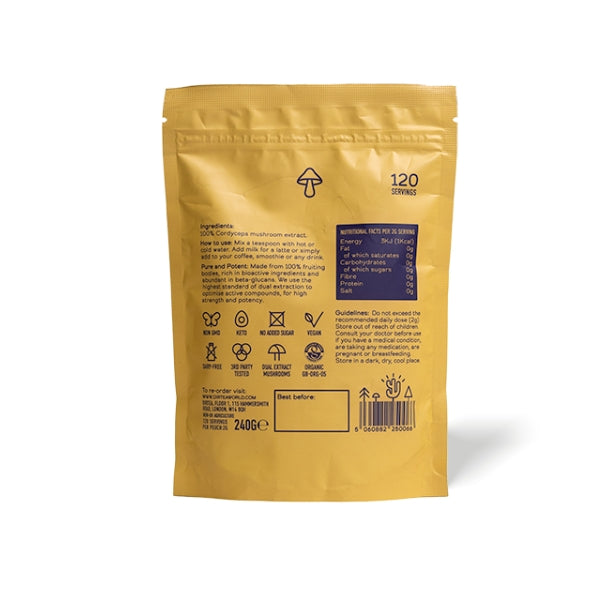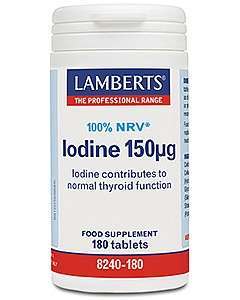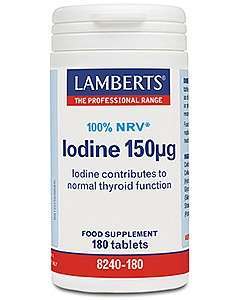Lamberts Iodine 150 mcg
Lamberts Iodine 150mcg 180 Tablets contain Kelp extract, which has long been known to be a rich source of Iodine. A full 150µg of iodine is provided in every tablet and or although needed by the Body in tiny amounts, iodine is important for general health & wellbeing - the kelp found in Lamberts Iodine, is a carefully controlled level of this trace mineral, sourced from clean, unpolluted waters.
- 180 tablets.
- Suitable for vegetarians.
- Contains kelp, a rich source of iodine.
- 150µg of iodine provided in every tablet.
- Important for general health & wellbeing.
- Aids the production of thyroid hormones & regular thyroid function.
- Contributes to functioning of the nervous system, the maintenance of healthy skin and to cognitive function.
What does Iodine do?
Iodine contributes to normal functioning of the nervous system, the maintenance of healthy Skin and to normal cognitive function. Iodine is also essential to the thyroid glands for manufacturing thyroxine, a hormone that regulates metabolism in all the body's cells.
Iodine recommended daily intake:
The recommended target for iodine is 140mcg daily for adult men and women. One teaspoon of iodised salt contains about 300mcg of iodine. Despite the body's requirement of just small amounts of iodine, this mineral is still important to an indvidual's overall health. In the 1920's the US government declared that iodine should be added to table Salt, a foodstuff common to nearly everyone. This introduction of iodised salt to the American diet virtually eliminated one severe form of mental retardation called cretinism. In the UK salt is not routinely iodised, although you can buy an iodised brand of salt if you wish to supplement iodine in this way. Apart from iodised salt, fish and seafood are the best dietary sources of iodine, as well as fruit, vegetables and cereals grown in iodine-rich soil.
Despite the recognised importance of iodine, 1.6 million people in the world (mainly in developing countries) still suffer from iodine deficiency. An analysis of ten different studies conducted in countries where iodine deficiency is common, showed a negative affect to motor skills, reaction time, manual dexterity, coordination and muscle strength. Iodine deficiency is extremely rare in the developed countries, but the first signs include an enlarged thyroid gland, known as goitre. Lack of iodine can cause the gland to expand in an attempt to increase its surface area and trap as much of the iodine in the bloodstream as possible. Although a low iodine intake can result in low levels of thryroid hormone (hypothyroidism), the most likely cause is a condition known as myxoedema, which results from autoimmune damage (when the body's immune system turns on itself). Hypothyroidism is characterised by fatigue, dry skin, a rise in blood fats, a hoarse voice, delayed reflexes and reduced mental clarity.
Directions of Use
Take 1 - 3 Lamberts Iodine 150mcg Tablets daily with a meal, or as directed by a practitioner or pharmacist.
Disintegration Time: Less than 1 hour.
Caution:
- Keep away from children.
- Do not exceed the recommended daily dose.
- Food supplements should not be a substitute for a varied diet.
- Pregnant women should consult their doctor before taking Lamberts Iodine Tablets.
Storage:
Lamberts Iodine should be stored in a cool dry place and protected from light.
Ingredients
Each tablet delivers:
lodine (from kelp extract) 150µg.
Tableted with:
DiCalcium Phosphate, Cellulose, Silicon Dioxide, Stearic Acid, Magnesium Stearate.
Allergen advice:
The following list of allergens are excluded: Wheat, Barley, Soya, Eggs, Milk (and milk products), Lactose, Nuts, Sulphites, Celery, Fish, Shellfish, Yeast and Gluten containing ingredients.







